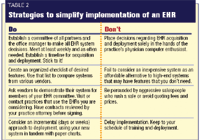A stepwise, simplified approach to implementing (and learning to love) an EHR
Hands down, the electronic health record improves your efficiency and productivity. Prices for fully functional EHR software continue to decline, hardware is now affordable, and financing comes more easily. So why do many physicians still resist the EHR?
DR. SCHUMAN is adjunct assistant professor of pediatrics at Dartmouth Medical School, Lebanon, N.H., and practices pediatrics at Hampshire Pediatrics, Manchester, N.H. He is a contributing editor for Contemporary Pediatrics. He has developed and distributes the Practical Medical Record, an EHR system designed for pediatric practice.
If your practice has missed the opportunity to be among the early adopters of an electronic health record (EHR) system, then now, or the near future, is a good time to consider implementation. Prices of EHR systems are falling as rapidly as their quality is improving-the result of an increasingly crowded and competitive market.
Pediatricians appear to be among the more conservative medical specialists when it comes to acquiring an EHR system: Results of a 2005 Medical Economics survey demonstrate that only 16% of pediatricians use an EHR in the office, compared with 20% of family practitioners and 22% of internists.

This article is aimed at the 84% of office-based pediatricians who have either delayed or avoided implementing an EHR. My goal is to guide you in EHR selection, acquisition, and deployment.
Overcoming Fear #1: The cost
A high-end EHR system can cost $20,000 to $30,000 for eachphysician in a practice, after factoring in license fees, training and support fees, and hardware costs-although affordable high-quality systems are available. In comparison, implementing an inexpensive system for a single physician practice can be easily accomplished for less than $5,000 to $8,000. Additional costs to consider include hardware maintenance and a yearly EHR maintenance or license fee, in addition to the original software license. (You may notice measurable reduction in office efficiency during the first few months after deployment, before all staff is fully comfortable with the full range of applicable features of the new system.) Many physicians don't realize a financial benefit from the system for months, even years, after deployment-not until improved documentation of patient visits allows for more appropriate billing and better identification of patients who need a return visit or more comprehensive evaluation.
Fear #2: Performance anxiety

Starting the project
Have you made the decision to go for an EHR system? Then it's time to begin meeting weekly, perhaps over lunch, with your partners and practice administrator or office manager to discuss the acquisition. Resist the tendency to appoint the most computer-literate and enthusiastic physician to chair the project; instead, assign a physician-partner who is less computer literate to this position-someone more likely to take a balanced approach and less likely to be influenced by an aggressive salesperson.